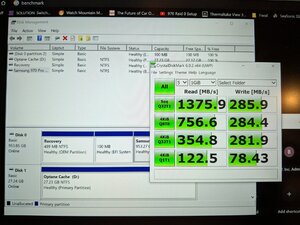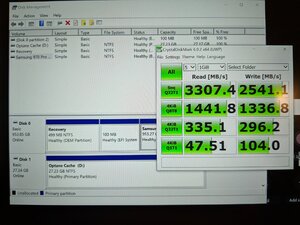OliverQueen
Limp Gawd
- Joined
- Apr 17, 2019
- Messages
- 170
I have been thinking about adding an Intel Optane module of either 16GB or 32GB into the new system, but I don't know if I will see much benefit from doing so. All but the storage drives are SATA6Gbs SSD or vNAND m.2 varients and are fairly rapid compared to the older system that only had standard SATA SSD in it.
Windows 10 takes 5 seconds to boot from cold once past the BIOS screen (BIOS screen takes longer to process than boot time!).
Applications & large files load quick enough & game level loading times are good with games that I have moved onto one of the existing SSD's (ones I play more than others).
I know that it would mean removing the Samsung P981 based m.2 drive from the onboard port & placing it in a slot adaptor (which I already have sitting on the racking anyway).
I have no actual experience with Optane cache technology, so before biting the bullet & getting one, would I see much benefit or performance boost over the system without it? It would be going in the system in my signature, which if it is TL/DR for you;
i7 8700 (non-K)
32GB PC3000 DDR4
Z370 chipset board
GeForce RTX2070
512GB Samsung 970 Pro m.2
512GB Samsung 860 EVO SATAIII
512GB Samsung P981 based m.2 (which will be moved to slot adaptor if Optane module used)
2 x 3GB Seagate Barracuda 7200rpm 64MB cache HDD (RAID 0)
Windows 10 Home 64bit
What benefits would I be looking at with Optane caching, what size would be best (match per GB to RAM?)? Any drawbacks that I should be aware of?
Windows 10 takes 5 seconds to boot from cold once past the BIOS screen (BIOS screen takes longer to process than boot time!).
Applications & large files load quick enough & game level loading times are good with games that I have moved onto one of the existing SSD's (ones I play more than others).
I know that it would mean removing the Samsung P981 based m.2 drive from the onboard port & placing it in a slot adaptor (which I already have sitting on the racking anyway).
I have no actual experience with Optane cache technology, so before biting the bullet & getting one, would I see much benefit or performance boost over the system without it? It would be going in the system in my signature, which if it is TL/DR for you;
i7 8700 (non-K)
32GB PC3000 DDR4
Z370 chipset board
GeForce RTX2070
512GB Samsung 970 Pro m.2
512GB Samsung 860 EVO SATAIII
512GB Samsung P981 based m.2 (which will be moved to slot adaptor if Optane module used)
2 x 3GB Seagate Barracuda 7200rpm 64MB cache HDD (RAID 0)
Windows 10 Home 64bit
What benefits would I be looking at with Optane caching, what size would be best (match per GB to RAM?)? Any drawbacks that I should be aware of?
![[H]ard|Forum](/styles/hardforum/xenforo/logo_dark.png)

